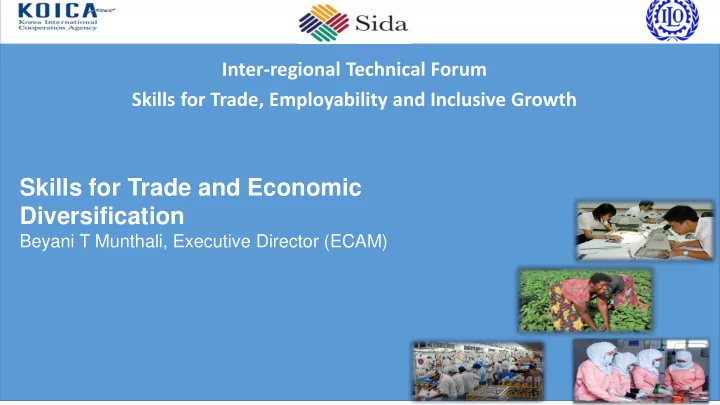

Inter-regional Technical Forum Skills for Trade, Employability and Inclusive Growth Skills for Trade and Economic Diversification Beyani T Munthali, Executive Director (ECAM)
Malawi • Small economy, dependant on primary agriculture production with Gross Domestic Product (GDP) estimated at US$3.7 billion • A widening trade imbalance widened from 12.1% of GDP in 2011 to 22.6% of GDP in 2014 • Narrow Economic and export bases with limited value addition • National Export Strategy (NES, 2012) aims to broaden export base, increase productivity and enhance value addition • Availability of Skills labour a challenge (NES, 2012) to realizing growth and export potential in priority export clusters
Applying the STED approach…. Generate Demonstrate STED Research in Horticulture & evidence on STED skills Oilseeds Sectors sectors’ trade anticipation competitiveness methodology Why? Export potential Identify skill TVET level skills and important to the implications sector’s competitiveness in international trade. Contribution to economic diversification Potential to generate employment Increasing productivity and competitiveness of Geographic Stakeholder engagement enterprises Policy synergies Improving employability of local people Expanding inclusiveness of economic growth
Expected Outcomes 1. Evidence base for strategic decision making A Roadmap for trade-related and industry focused skills development A Call to Action for Policy makers, Training Providers, Private sector & Dev. partners A Resource Targeting Tool for demand-led skills development 2 . Enhanced national capacity for skills anticipation and social dialogue Capacity to use labour market information to direct skills development Foster Dialogue for skills development that is:- more demand led, trade-related Employability focused
STED Research Structure Preliminary Research May – Aug 2015 Feb 2016 Sept – Nov 2015 2016 Mar/ Apr 2015 1. Desk Research Stakeholder Validation (WIL & Productivity Synthesis & Stakeholder on Sectors’ context & of Findings, Conclusions Analysis Consultations envisioning Implementation Recommendations enhancement On Sector 2. Oilseeds sector selection Enterprise Survey Final STED Report Draft STED report 3.Horticulture Enterprise S urve y Sectors --Oilseeds Horticulture 4. Skills supply analysis Stakeholder Consultations
STED Research Outcomes …….. Findings & Pilot Recommendations Implementation
Sector Envisioning Preferred growth scenario for the two sectors? Sector Upgrade! Producing and Same, BUT More exporting more and Producing and exporting new higher value more of existing products to same & products to same new markets markets Sequential and incremental approach, ensuring adequate supply of high quality local raw materials for processing
Translating the Vision … Raise Oilseed sector’s contribution to exports Oil seeds exports increase from 5.63% in 2014 (NSO) from $79.6 million in 2014 to to around 15% in 2022 $599 million in 2022. Raise Horticulture sector’s contribution to exports from Horticulture exports increase 0.52% in 2014 (NSO) to from $7.4 million in 2014 to around 1.4% in 2022 $55.5 million in 2022
Vision Anchors… • Shift focus from domestic to export markets • Scale up production and improve quality • Re-orient industry towards exports • Stabilize supply to sustain growth path Ex • Stabilize fluctuating supply to regional markets and build on growing local market • Implement existing plans to enter new markets • Exploit and build on existing competitive advantage • Take advantage of pproximity to regional markets • Take advantage of LDC status & existing preferential trade arrangement
Overview of findings • Skills gaps • (66.7%) of enterprises regard Business environment as an important factor for • Quality of graduates penetrating the Common Market for • Filling in vacancies Eastern And Southern Africa (COMESA) • Production • No certification of local products for • Handling (cleaning and grading) export • Marketing • High transportation costs • Enabling Environment • Business capability • Inadequate Business Development Service • Supply: Inconsistent supply Providers • Product development low value and range • Poor access to technical assistance by • Logistics and supply chain management producers -low productivity • Management of quality and standards • Inefficient production techniques. • Supply chain management www.ilo.org Siem Reap, 30-31 May 2017 10
Research Findings Sectors largely underdeveloped, serving domestic market and to a lesser extent exports to regional markets Access to wider export markets requires • Increased productivity and Consistent raw materials supply • New products that meet international standards • Improvement in logistics and better market access • More exposure to international standards and markets • More effective linkages across value chain
General Sector Business Capability Gaps Supply: Inconsistent supply • Weak linkages between farmers, aggregators and end markets • Weak extension support system • Limited mechanisation • Low production and productivity levels Product development: Low value products and range • Limited knowledge of market requirements (products, pricing & quality) • Limited understanding end user needs (80%) • Poor grading, packaging and storage capacities • R&D and innovation (100%)
STED Research Recommendations Long Term Short Term Medium 0-2 years > 5 years Term 2-5 years • Industry Guest • Upgrade Qualifications of • Curriculum Review & Re- lecturers Staff orientation • International • Modernize training • Partnerships with Industry Lecturers equipment & Laboratories in skill training delivery • Workplace based • Introduce sandwich • Partnerships with Learning Programs international Institutions • Enhance • Institutionalize demand • Introduction of new Dialogue- led apprenticeships informal courses Industry + TPs
Skill levels required Both Oilseeds and Horticulture sectors require expertise at a) Artisanal/operative level b) Technician/ technologist level c) Management and profession level Effective value addition will require build up of sufficient skills levels in both quality and quantity at artisanal level, followed by technician levels
Thank you for your attention (Arkoun Zikomo)
Recommend
More recommend